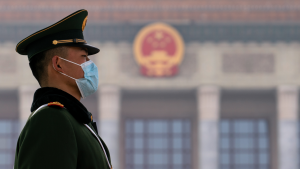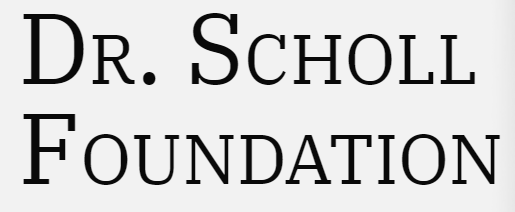A plurality of Americans—and a majority of Republicans—also say that US leaders are not paying enough attention to US-China competition.
The 2023 Chicago Council Survey, conducted September 7–18, 2023, finds Americans more concerned about the rise of China than at any point since the end of the Cold War.
Key Findings
- A record level of Americans (58%) view China’s development as a world power as a critical threat to the vital interest of the United States, the highest level recorded in Chicago Council Surveys dating back to 1990.
- The American public is evenly divided over who is stronger economically, with a third pointing to the United States (33%), another third pointing to China (32%), and a final third saying the two are about equal in economic power (33%).
- Americans are more confident in US military power vis-à-vis China (46% pick the United States, 15% China, 37% about equal).
- On a 10-point scale of global influence, Americans rate the US an average of 8.4 and China at 7.5—the narrowest gap recorded in the Chicago Council Surveys dating back to 2002.
- A plurality of Americans (46%) say that US leaders are not paying enough attention to the issue of US competition with China.
- Across issue areas from human rights to intellectual property rights, Americans are generally more likely to say that the US government’s response to China has not gone far enough than to say it has been about right, with few viewing it as having gone too far.
Majorities across Party Lines View China’s Rise as a Critical Threat
A majority of Americans (58%) view the development of China as a world power as a critical threat to the interest of the United States. This is the highest-recorded level of concern since the Council first asked the question in 1990. This year also marks the first time since 2002 that at least a narrow majority of Republicans (71%), Independents (53%), and Democrats (52%) all view China’s rise as a critical threat.
Little Confidence in China to Deal Responsibly with World Problems
In addition to viewing Beijing’s rise as a threat to the United States, Americans no longer trust China to handle global problems. Today only 19 percent of Americans say they have a great deal (3%) or a fair amount (16%) of confidence in China to deal responsibly with world problems, a negative assessment that is shared across party lines. This represents a sharp decline from 2018, when four in 10 Americans (41%) had at least some confidence in China to responsibly handle global problems.
Public and Leaders Paying Attention to US-China Relations
At a time when public concern about China is back at an all-time high, a plurality of Americans (46%) also say that US leaders are not paying enough attention to the issue of US competition with China. Another third (35%) say leaders are paying about the right amount of attention to the issue, while 17 percent say they are paying too much attention.
Republicans, more concerned about China in general, are notably more likely to say US leaders are not paying enough attention to US-China competition (60%, compared to 46% of Independents and 36% of Democrats). Democrats, perhaps reflecting their greater trust of the current administration or their lower concerns about China’s rise, are more likely to say leaders are paying the right amount of attention (43%, compared to 35% of Independents and 26% of Republicans).
For their part, a majority of the American public (67%) say they are at least somewhat interested in news about US-China relations, though this lags behind interest in national news (77%) and news about US foreign relations (72%).
Americans Have Varied Concerns about China
When asked to choose the area of most concern about China, Americans divide almost evenly across different issue areas. Similar proportions of Americans point to China’s economic power (23%), its communist political system (22%), its human rights policies (21%), and its military power (20%); an additional 12 percent say that none of the above are their main concern.
Concern about China’s economic power is similar across party lines, but greater partisan divisions emerge on other issues. Republicans tend to be more worried about China’s political system (28%) and military power (26%), while Democrats are more troubled by China’s human rights policies (28%). Independents are somewhat more likely to say that none of these areas are a main concern about China (16%).
Public Says US Government Has Not Gone Far Enough on Many China Issues
Across a range of issue areas, Americans are generally more likely to say that the US government’s response to China has not gone far enough than to say it has been about right, with few saying it has gone too far. Majorities of Americans say that the government has not done enough on the theft of US intellectual property by Chinese companies (65%), Chinese surveillance against the US (62%), China’s policies on human rights (58%), and economic competition with China (52%). A plurality of the American public also views the US government’s response on China’s role in global supply chains and China’s political influence in international institutions as not going far enough (49% and 48%, respectively). However, the margin is narrower between those who think the government has not gone far enough or has been about right on China’s territorial claims in Asia and China’s military power.
For most issues, Republicans are more likely than other Americans to say the US government has not gone far enough in responding to China, with a particular concern about the US response to China’s military power. A majority (54%) say the United States has not gone far enough, while only a third of Democrats say the same (32%, 48% say it has been about right). The lone issue where Democrats are somewhat more likely to say the United States has not gone far enough is on human rights. On that issue, 62 percent of Democrats and 54 percent of Republicans agree the Washington has not gone far enough. This reflects Democrats’ generally greater concerns about human rights, both in the context of US-China relations and more broadly. Democrats, for example, are far more likely than Republicans to say it is very important for the US to be a world leader on human rights (78%, vs. 51% of Republicans).
Americans Split over Who Leads in Economic Power
One reason for this general feeling that the United States has not done enough to respond to China’s economic heft: concern about the relative standing of US and Chinese economic power. The American public is evenly divided over which country is stronger economically, with a third pointing to the United States (33%), another third pointing to China (32%), and a final third saying the two are about equal in economic power (33%). However, this is a modest improvement from where Americans viewed US economic power in 2014. Since then, Americans have become less likely to view China as the stronger economic power and more likely to see the United States and China as roughly equal.
Plurality of Americans Confident in US Military Superiority over China
Americans feel the United States is on somewhat stronger footing when it comes to military power: a plurality of Americans say that the United States (46%) is militarily stronger than China (15%), though more than a third say the two are about equal (37%). Yet over the past decade, and particularly since 2019, Americans have become slightly less confident in US military superiority and more likely to view the two nations as equally matched.
Plurality of Americans Confident in US Military Superiority over China
This narrowing of relative power is also evident in Americans’ evaluations of US and Chinese global influence. On a 10-point scale, Americans today rate the United States at an average of 8.4, and give China a mean rating of 7.5. That puts the gap between US and Chinese influence at its closest point yet in the Chicago Council Survey: down to 0.9 points on a 10-point scale.
This analysis is based on data from the 2023 Chicago Council Survey of the American public on foreign policy, a project of the Lester Crown Center on US Foreign Policy. The 2023 Chicago Council Survey was conducted September 7-18, 2023 by Ipsos using its large-scale nationwide online research panel, KnowledgePanel, in both English and Spanish among a weighted national sample of 3,242 adults aged 18 or older living in all 50 US states and the District of Columbia. The margin of sampling error for the full sample is ±2.0 percentage points including a design effect of 1.2908. The margin of error is higher for partisan subgroups or for partial-sample items.
Partisan identification is based on how respondents answered a standard partisan self-identification question: “Generally speaking, do you think of yourself as a Republican, a Democrat, an Independent, or what?”
The 2023 Chicago Council Survey is made possible by the generous support of the Crown family, the Korea Foundation, and the United States-Japan Foundation.


Related Content
 Public Opinion
Public Opinion
With Xi Jinping poised to receive a third term at the 20th Party Congress, American opinion of China has never been worse.
 Public Opinion
Public Opinion
In new Council polling, Americans say China’s treatment of minority groups isn’t just a question of internal politics.
 Public Opinion
Public Opinion
A March 2021 survey finds Americans see US priorities in Asia to be less about limiting the expansion of China and more about economic growth and strengthening democracy.




